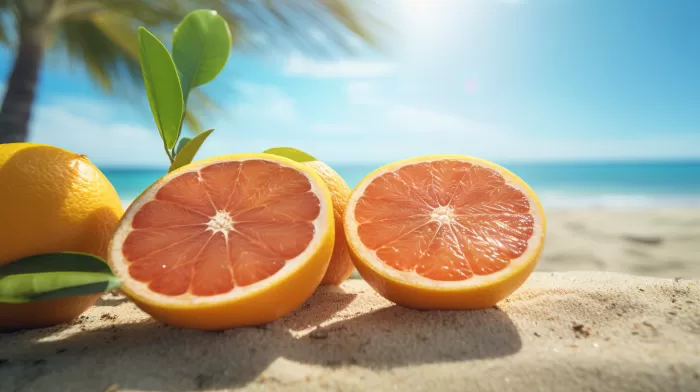Sun and citrus fruits have many health benefits, but they can also make for a dangerous combination when it comes to melanoma, the deadliest form of skin cancer. While soaking up the sun’s rays provides essential vitamin D, too much sun can do more harm than good, increasing the risk of skin cancer. Surprisingly, certain citrus fruits can also contribute to this risk.
When planning a sunny day out, it might be best to consider avoiding oranges, grapefruits, and their juices. Studies, including research conducted at the Warren Alpert Medical School of Brown University, have found that furocoumarins, chemicals present in these citrus fruits, could raise melanoma risks. Participants in the study who consumed these fruits and their juices the most were 36 percent more likely to develop melanoma compared to those who seldom indulged.
Citrus furocoumarins and UV radiation
Citrus furocoumarins have been found to make the skin more sensitive to the sun’s ultraviolet (UV) radiation. Notably, grapefruit demonstrates the strongest association with melanoma risk among citrus fruits. If you spent a lot of time in the sun as a child and experienced sunburns, your risk from citrus fruits may be higher than for those who spent more time indoors during their childhood.
Despite these risks, there is no need to eliminate these fruits from your diet altogether. They are abundant in vitamin C and other essential nutrients, but moderation is key. If you plan to be outdoors for an extended period, opt to leave these fruits out of your meal plan for the day.
On the other hand, there are alternative foods and beverages that can even help reduce skin cancer risk.
Coffee
According to research at the National Cancer Institute, drinking up to four cups of coffee per day can decrease skin cancer risk by roughly 20 percent. This is due to the natural chemicals present in coffee that provide protection from the sun’s harmful effects.
Green tea
Researchers in Scotland found that green tea contains a compound called epigallocatechin gallate, which can potentially eliminate skin tumors. Regularly consuming green tea could significantly reduce skin cancer risk.
Blueberries, apples, pears, and other non-citrus fruits
Apart from citrus fruits, eating a variety of other fruit can support your body’s ability to fight skin cancer. A study in Connecticut displayed a positive correlation between eating plenty of fruit and reduced skin cancer risk. Thus, choosing an apple, pear, or some blueberries over an orange or grapefruit when you are going to spend a day in the sun is a far safer option.
Balancing the benefits and risks
Sunshine is vital for producing vitamin D, and citrus fruits offer a wealth of essential nutrients. However, being mindful of their potential harmful impact on skin cancer risk is crucial. By moderating your exposure to both sun and citrus on any given day, you can enjoy their health benefits without increasing your melanoma risk. So, plan your outdoor and citrus fruit-consuming activities carefully and ensure a well-rounded, balanced approach to your overall health and wellbeing.



